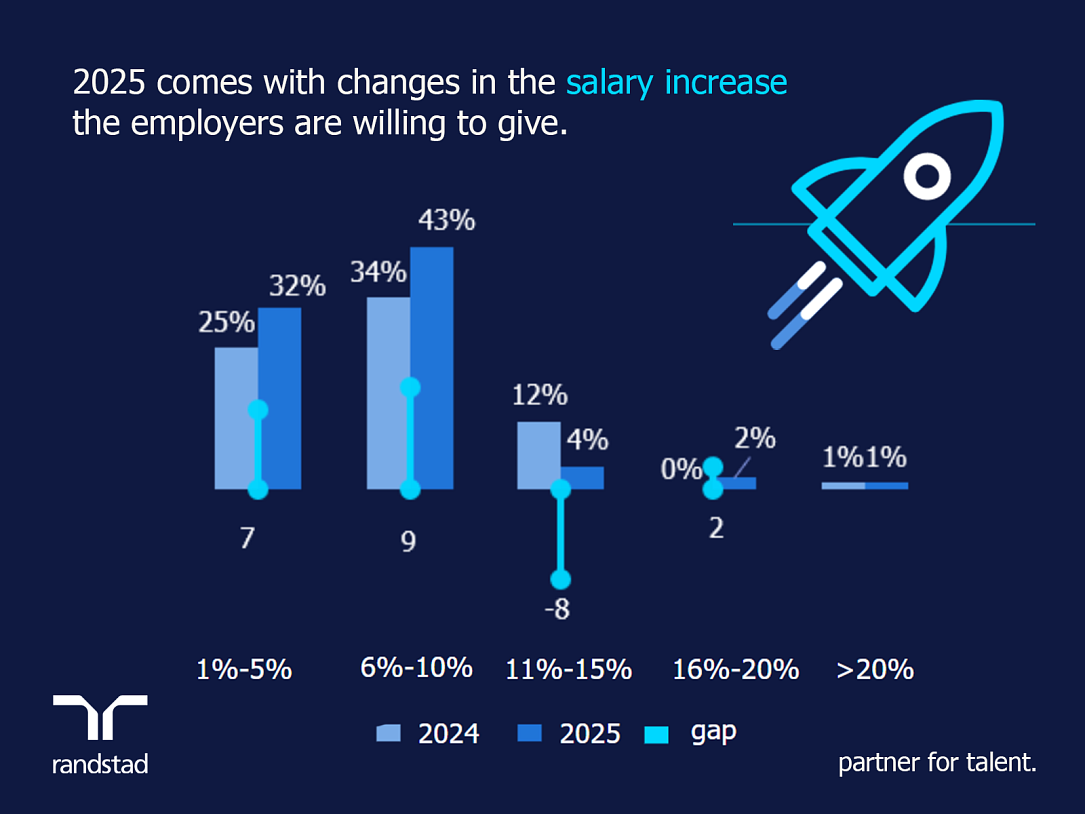Randstad Romania HR Trends: 6-10% higher salaries for Romanian employees in 2025



Over 80% of employers in Romania plan to raise salaries this year, with most increases expected to be between 6% and 10%, according to the Randstad Romania HR Trends 2025.
The survey shows that the business environment looks to 2025 with moderate optimism. Roughly 43% of companies anticipate revenue growth in 2025 (compared to 41% last year), while 10% expect a decrease (compared to 4% in 2024). Meanwhile, 63% of respondents expecting a sales increase say it will range from 4% to 10% this year.
Significant differences are noted compared to the Czech Republic, where only about one-third of business representatives expect revenue growth, while in Hungary, half of employers are optimistic about this indicator.
About 82% of employers plan to increase salaries in 2025, but the planned percentage is lower than employee expectations. The average salary increase range is 6%-10%, while according to a survey conducted by Randstad Romania on social media, 37% of employees believe the increase should exceed 20%. Only 1% of employers are willing to offer such significant increases. The gap can lead to higher employee turnover and difficulties in talent retention.
“The future of the Romanian labor market will be defined by a balance between technology, continuous education, and benefits addressing both professional and personal employee needs. A conclusion we can draw is that we are at a moment of reconfiguring the leadership vision of teams, with an emphasis on creating and developing ecosystems that allow employees to grow and have the career that fulfills them,” said Ionuț Huzu, Commercial Director of Randstad Romania.
Roughly 34% of companies intend to hire this year, primarily due to business growth or national/international organizational development, while 13% will freeze hiring. The most recruitment will be for positions in sales (up by 10% compared to last year), engineering, customer service/aftersales services, IT, or positions with operational responsibilities.
The main barriers to recruitment this year continue to be candidates’ high salary expectations (although down by 8% from 2024) and the lack of relevant work experience in the industry they are applying to.
The IT, telecom, services, and industrial-manufacturing sectors expect the most hiring. Additionally, sectors such as BSS (Business Support Services) and real estate/construction will continue to expand their teams, due to increased demand for specialized services, respectively infrastructure projects.
Some sectors will see stable or even decreasing hires (automotive, transport-logistics, financial services). Production and operations are the areas where companies face the biggest challenges in finding qualified staff. Also, recruitment for IT, sales, and logistics departments is becoming more difficult, generating significant competition in attracting specialists in these fields.
According to the same study, 71% of companies believe that online professional networks, such as LinkedIn, will be the most effective methods of attracting candidates in 2025. Additionally, internal employee referral programs and partnerships with recruitment agencies remain popular methods for identifying the right talent.
The study shows that faced with the talent shortage on the local market, more and more companies in Romania are focusing on recruiting from developing countries. 14% of employers plan to hire workers from third-world countries for blue-collar positions (workers/production), while only 6% are seeking white-collar specialists (office employees) from outside the European Union. Most companies prefer to recruit these employees through certified temporary employment agencies.
About 66% of employers consider that retaining talent is the main difficulty in human resources, emphasizing the need for effective retention strategies. At the same time, 59% of companies are facing difficulties in attracting new employees, and 52% are struggling to keep employees engaged and motivated.
Meanwhile, 64% of companies are open to using AI, compared to 58% in 2024. AI is predominantly implemented for automating repetitive tasks, data analysis, recruitment, and customer support. 29% of employers do not yet have a clear AI strategy.
The Randstad Romania HR Trends 2025 research was conducted between October and December 2024, based on an online survey of 204 leaders from various industries. It was carried out in partnership with Evalueserve, a global market research and analytics company.
(Photo source: Randstad press release)